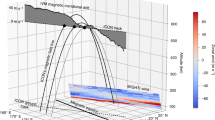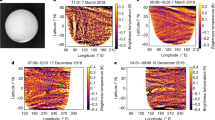Abstract
THERE have been a number of attempts during the past few years to investigate movements in the earth's ionosphere by radio techniques, in which signals, transmitted from the earth, are observed after reflexion in the ionosphere1. This communication summarizes results obtained recently by a new method, in which use has been made of the extraterrestrial radiation from the two most intense radiostars in the constellations of Cygnus and Cassiopeia.
This is a preview of subscription content, access via your institution
Access options
Subscribe to this journal
Receive 51 print issues and online access
$199.00 per year
only $3.90 per issue
Buy this article
- Purchase on Springer Link
- Instant access to full article PDF
Prices may be subject to local taxes which are calculated during checkout
Similar content being viewed by others
References
Report on a Geophysical Discussion of the Royal Astronomical Society, Nature, 167, 626 (1951); Observatory, 71, 104 (1951).
Little, C. G., and Maxwell, A., Phil. Mag., 42, 267 (1951).
Ryle, M., and Hewish, A., Mon. Not. Roy. Astro. Soc., 110, 381 (1950).
Author information
Authors and Affiliations
Rights and permissions
About this article
Cite this article
MAXWELL, A., LITTLE, C. A Radio-Astronomical Investigation of Winds in the Upper Atmosphere. Nature 169, 746–747 (1952). https://doi.org/10.1038/169746a0
Issue Date:
DOI: https://doi.org/10.1038/169746a0
This article is cited by
-
Traveling ionospheric disturbances?A review
Radiophysics and Quantum Electronics (1968)
-
Winde und turbulente Luftströmungen in der Ionosphäre
Archiv für Meteorologie, Geophysik und Bioklimatologie Serie A (1954)
Comments
By submitting a comment you agree to abide by our Terms and Community Guidelines. If you find something abusive or that does not comply with our terms or guidelines please flag it as inappropriate.



